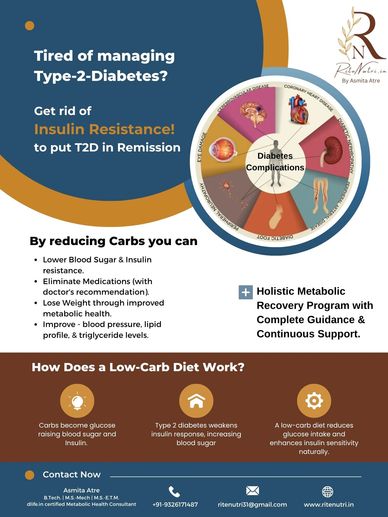Holistic Metabolic Healing Programs
Diabetes
Insulin Resistance
Hypertension

A low-carb nutrition program for diabetes remission emphasizes significantly reducing carbohydrate intake to stabilize blood sugar, improve insulin sensitivity, and promote weight loss. This approach often focuses on whole, unprocessed foods like non-starchy vegetables, lean proteins, and healthy fats, aiming to reverse or put diabetes into remission.
Hypertension
Insulin Resistance
Hypertension

A low-carb nutrition program for hypertension remission focuses on reducing carbohydrate intake, leading to a decrease in cardiac risk markers, such as triglycerides, Lipoprotein(a), Apolipoproteins (A1 and B), and hs-CRP. This dietary approach leads to weight loss, improves insulin sensitivity, helps stabilize blood pressure, and may reduce the need for medication.
Insulin Resistance
Insulin Resistance
Insulin Resistance

A low-carb nutrition program for improving insulin sensitivity focuses on drastically reducing carbohydrate intake to lower blood sugar and insulin levels. Insulin resistance can be cured only through therapeutic carbohydrate restriction. This leads to weight loss and better metabolic health by emphasizing non-starchy vegetables, proteins, and healthy fats.
PCOS / PCOD
PCOS / PCOD
Insulin Resistance

A low-carb nutrition program for PCOS remission focuses on reducing carbohydrate intake to improve insulin sensitivity, a key driver of balancing female hormones. By stabilizing blood sugar and promoting weight loss, it can improve ovarian function, regulate cycles, and alleviate PCOS symptoms like acne and hirsutism.
Menopause
PCOS / PCOD
Menopause

A low-carb nutrition program helps ease menopausal issues through improved functioning of the liver, thyroid, and adrenal glands. Insulin levels, which often fluctuate during this phase, can be stabilized through therapeutic carbohydrate restriction, leading to better metabolic health.
Obesity
PCOS / PCOD
Menopause

Elevated Insulin levels prevent fat cells from burning fat. A low-carb nutrition program for obesity management significantly reduces carbohydrate intake, promoting fat burning and satiety. It helps stabilize blood sugar, insulin levels, and ultimately facilitates sustainable weight loss.
NAFLD
Thyroid Dysfunction
Thyroid Dysfunction

A low-carb program for NAFLD remission focuses on reducing dietary carbohydrates, especially refined sugars and starches. This strategy helps decrease liver fat accumulation, promote the body's internal fat-burning mechanisms, improve insulin sensitivity, and promote weight loss, all crucial for reversing or managing non-alcoholic fatty liver disease.
Thyroid Dysfunction
Thyroid Dysfunction
Thyroid Dysfunction

A low-carb approach for thyroid dysfunction often focuses on reducing inflammation and supporting overall metabolic health. While a strict ketogenic diet might not be suitable for everyone with thyroid issues due to potential T3 reduction, a moderate low-carb intake, emphasizing whole foods, can help manage symptoms like weight gain and fatigue.
Child Nutrition
Thyroid Dysfunction
Child Nutrition

Concerned about your child's metabolic health?
Now is the perfect time to build a strong foundation in child nutrition with our transformative program — "Nourish to Flourish."
The right nutrition fuels optimal growth, cognitive development, and lifelong vitality. Let’s empower your child to thrive from the inside out.
This website uses cookies.
We use cookies to analyze website traffic and optimize your website experience. By accepting our use of cookies, your data will be aggregated with all other user data.